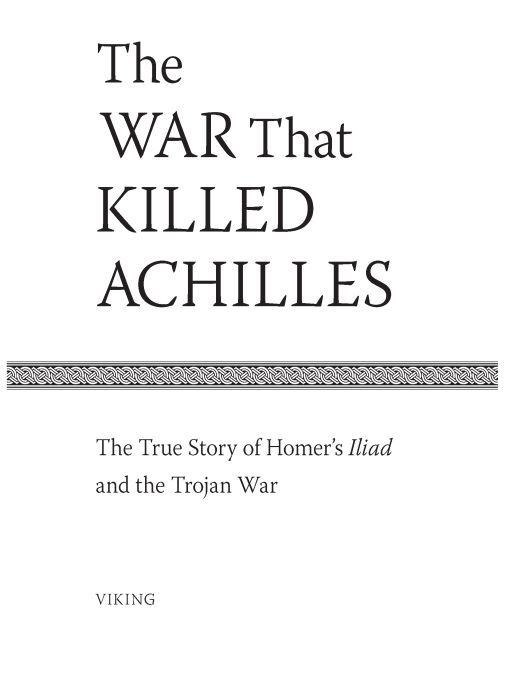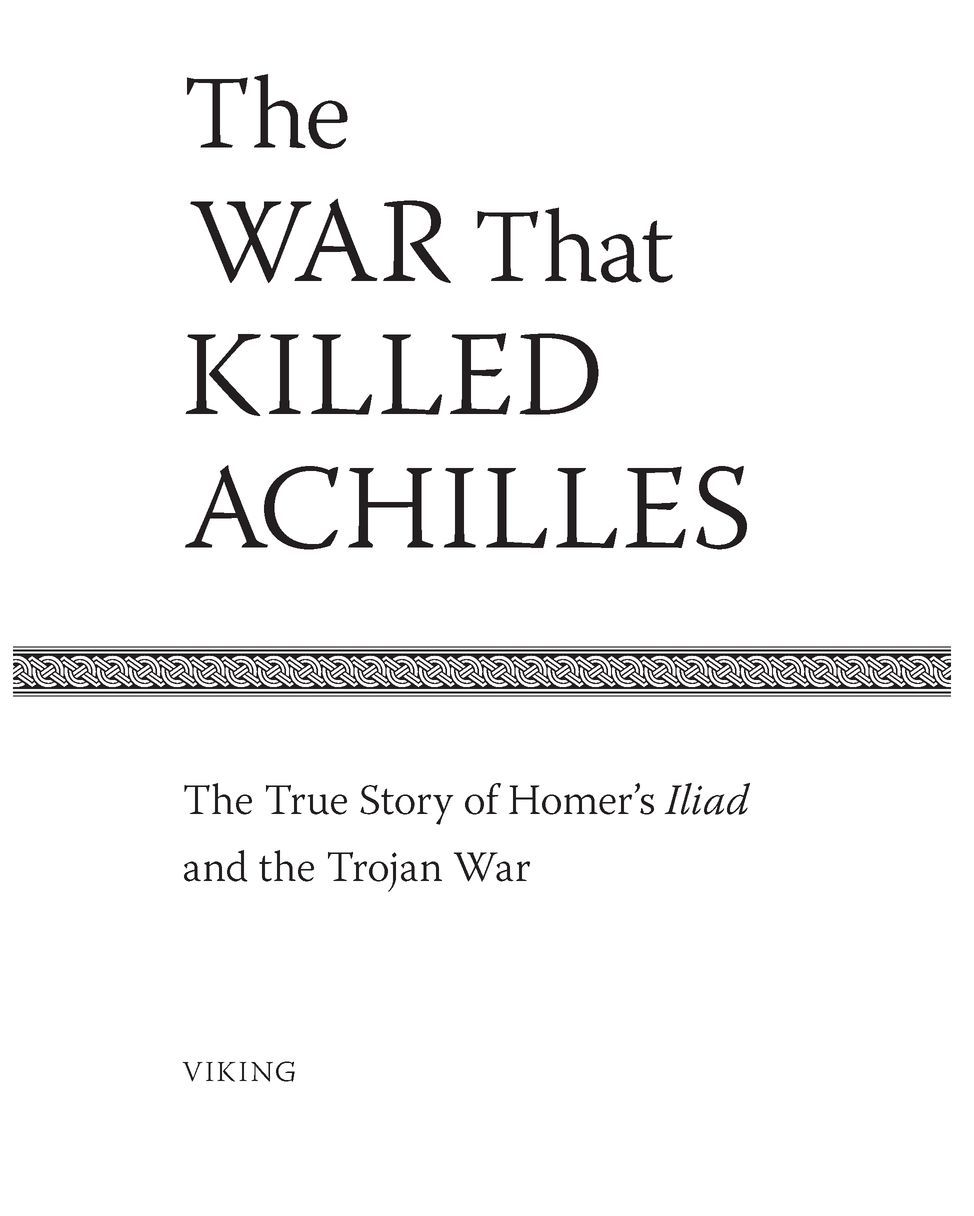The War That Killed Achilles
Read The War That Killed Achilles Online
Authors: Caroline Alexander


Table of Contents
Â
Â

ALSO BY CAROLINE ALEXANDER

The Bounty
The Endurance
Mrs. Chippy's Last Expedition
Battle's End
The Way to Xanadu
One Dry Season
The Endurance
Mrs. Chippy's Last Expedition
Battle's End
The Way to Xanadu
One Dry Season
CAROLINE ALEXANDER

VIKING
Published by the Penguin Group
Published by the Penguin Group
Penguin Group (USA) Inc., 375 Hudson Street, New York, New York 10014, U.S.A. ⢠Penguin Group (Canada), 90 Eglinton Avenue East, Suite 700, Toronto, Ontario, Canada M4P 2Y3 (a division of Pearson Penguin Canada Inc.) ⢠Penguin Books Ltd, 80 Strand, London WC2R 0RL, England ⢠Penguin Ireland, 25 St. Stephen's Green, Dublin 2, Ireland (a division of Penguin Books Ltd) ⢠Penguin Books Australia Ltd, 250 Camberwell Road, Camberwell, Victoria 3124, Australia (a division of Pearson Australia Group Pty Ltd) ⢠Penguin Books India Pvt Ltd, 11 Community Centre, Panchsheel Park, New Delhi-110 017, India ⢠Penguin Group (NZ), 67 Apollo Drive, Rosedale, North Shore 0632, New Zealand (a division of Pearson New Zealand Ltd) ⢠Penguin Books (South Africa) (Pty) Ltd, 24 Sturdee Avenue, Rosebank, Johannesburg 2196, South Africa
Â
Penguin Books Ltd, Registered Offices: 80 Strand, London WC2R 0RL, England
Â
First published in 2009 by Viking Penguin, a member of Penguin Group (USA) Inc.
Â
Â
Copyright © Caroline Alexander, 2009All rights reserved
Â
Grateful acknowledgment is made for permission to reprint excerpts from
The Iliad of Homer,
translated by Richmond Lattimore. Copyright 1951 by the University of Chicago. Copyright renewed 1979 by Richmond Lattimore. Used by permission of the University of Chicago Press.
The Iliad of Homer,
translated by Richmond Lattimore. Copyright 1951 by the University of Chicago. Copyright renewed 1979 by Richmond Lattimore. Used by permission of the University of Chicago Press.
Â
LIBRARY OF CONGRESS CATALOGING-IN-PUBLICATION DATA
Alexander, Caroline, 1956-
The war that killed Achilles : the true story of Homer's
Iliad
and the Trojan War / Caroline Alexander.
p. cm.
Includes bibliographical references and index.
Alexander, Caroline, 1956-
The war that killed Achilles : the true story of Homer's
Iliad
and the Trojan War / Caroline Alexander.
p. cm.
Includes bibliographical references and index.
eISBN : 978-1-101-14885-3
1. Homer. Iliad. 2. War in literature. 3. Trojan WarâLiterature and the war. 4. Achilles (Greek mythology)
I. Title.
PA4037.A5955 2009
883'.01--dc22 2009020160
I. Title.
PA4037.A5955 2009
883'.01--dc22 2009020160
Â
Â
Without limiting the rights under copyright reserved above, no part of this publication may be reproduced, stored in or introduced into a retrieval system, or transmitted, in any form or by any means (electronic, mechanical, photocopying, recording, or otherwise), without the prior written permission of both the copyright owner and the above publisher of this book.
Â
The scanning, uploading, and distribution of this book via the Internet or via any other means without the permission of the publisher is illegal and punishable by law. Please purchase only authorized electronic editions and do not participate in or encourage electronic piracy of copyrightable materials. Your support of the author's rights is appreciated.
TO SMOKEY

oὠμὲν Î³Ã Ï Î¶Ïοί γε ÏίλÏν á¼ÏáνεÏ
θεν á¼ÏαίÏÏν
Î²Î¿Ï Î»Ã Ï á¼Î¶Ïμενοι Î²Î¿Ï Î»ÎµÏÏομεν
Î²Î¿Ï Î»Ã Ï á¼Î¶Ïμενοι Î²Î¿Ï Î»ÎµÏÏομεν
PREFACE

The
Iliad
is generally believed to have been composed around 750 to 700 B.C. and has been in circulation ever since.
1
The reason for this is not difficult to fathom. In addition to being a poem of monumental beauty and the origin of some of literature's most haunting characters, the
Iliad
is first and foremost a martial epic, its subject warriors and war. If we took any period of a hundred years in the last five thousand, it has been calculated, we could expect, on average, ninety-four of these years to be occupied with large-scale conflicts in one or more parts of the world.
2
This enduring, seemingly ineradicable fact of war is, in the
Iliad
's wise and sweeping panorama, as intrinsic and tragic a component of the human condition as our very mortality.
Iliad
is generally believed to have been composed around 750 to 700 B.C. and has been in circulation ever since.
1
The reason for this is not difficult to fathom. In addition to being a poem of monumental beauty and the origin of some of literature's most haunting characters, the
Iliad
is first and foremost a martial epic, its subject warriors and war. If we took any period of a hundred years in the last five thousand, it has been calculated, we could expect, on average, ninety-four of these years to be occupied with large-scale conflicts in one or more parts of the world.
2
This enduring, seemingly ineradicable fact of war is, in the
Iliad
's wise and sweeping panorama, as intrinsic and tragic a component of the human condition as our very mortality.
Today, headlines from across the world keep Homer close by. The dragging of the bodies of U.S. Rangers behind their killers' jeeps through the streets of Mogadishu evoked the terrible fate of the Trojan hero Hektor. A young American widow was reported as saying that she had tried to close the door against the soldier who appeared at her home in dress greens, believing that if she could keep him from speaking his news of her husband in Iraq, she could keep his news at bayâa small domestic scene that conjured the heartbreaking words of Hektor's widow, Andromache: “May what I say come never close to my ear; yet dreadfully I fear . . .” The
Iliad
's evocation of war's devastation, then, is as resonant todayâperhaps especially todayâas it was in Homer's Dark Age. Now, as at any time, Homer's masterpiece is an epic for our time.
Iliad
's evocation of war's devastation, then, is as resonant todayâperhaps especially todayâas it was in Homer's Dark Age. Now, as at any time, Homer's masterpiece is an epic for our time.
The classical age of ancient Greece knew the
Iliad
well, and the events surrounding the Trojan War furnished subjects for the great tragedians. Plato quoted and criticized Homer; Aristotle commented on him; Aristotle's most famous pupil, Alexander the Great, is alleged to have slept with a copy of the
Iliad
annotated by Aristotle under his pillow. More tellingly, it is said that when the conqueror of the known world himself arrived at what remained of Troy, he lamented the fact that unlike the hero Achilles, he, Alexander, had no Homer to glorify his deeds.
Iliad
well, and the events surrounding the Trojan War furnished subjects for the great tragedians. Plato quoted and criticized Homer; Aristotle commented on him; Aristotle's most famous pupil, Alexander the Great, is alleged to have slept with a copy of the
Iliad
annotated by Aristotle under his pillow. More tellingly, it is said that when the conqueror of the known world himself arrived at what remained of Troy, he lamented the fact that unlike the hero Achilles, he, Alexander, had no Homer to glorify his deeds.
Knowledge of Homer was brought to Rome in the third century B.C. by one Livius Andronicus, who composed Latin versions or imitations (as opposed to faithful translations) of the
Odyssey,
Homer's sequel to the
Iliad,
as well as of the works of the Athenian playwrights. Perhaps more important, he established a curriculum of study of the Greek language and letters, of which Homer's epic poems took pride of place. The centrality of Homer's epics to the education of the Roman elite was never displaced, and indeed, the works of Homer formed the foundation of Greek studies in the schools of the empire. Young Octavian, the future emperor Augustus, is reported to have quoted the
Iliad
following the death of his uncle Caesar: “I must die soon, then; since I was not to stand by my companion / when he was killed.”
3
Horace and Pliny knew Homer, Cicero criticized him, while Virgil's epic imitation borders at times on plagiarism.
Odyssey,
Homer's sequel to the
Iliad,
as well as of the works of the Athenian playwrights. Perhaps more important, he established a curriculum of study of the Greek language and letters, of which Homer's epic poems took pride of place. The centrality of Homer's epics to the education of the Roman elite was never displaced, and indeed, the works of Homer formed the foundation of Greek studies in the schools of the empire. Young Octavian, the future emperor Augustus, is reported to have quoted the
Iliad
following the death of his uncle Caesar: “I must die soon, then; since I was not to stand by my companion / when he was killed.”
3
Horace and Pliny knew Homer, Cicero criticized him, while Virgil's epic imitation borders at times on plagiarism.
When the Roman Empire split in the sixth century A.D., knowledge of Greek, which flourished in Byzantium, or the Eastern Empire, all but vanished in the West. The
Iliad
itself was forgotten, and in its stead stories about the war at Troy flourished, which, along with romantic sagas about Alexander the Great, formed the most popular “classical” material of the Middle Ages. The primary sources for these post-Homeric renderings of the matter of Troy, as the body of romance came to be called, were the Latin prose works of Dictys of Crete and Dares of Phrygia, dated to the third and fifth or sixth centuries A.D., respectivelyâboth of whom were fancifully believed to have been eyewitnesses to the Great War at Troy. In these Latin renderings, Achilles, the complex hero of Homer's
Iliad,
stripped of his defining speeches, devolved into a brutal, if heroically brave, action figure. In the hands of medieval writers, sentiment hardened further against him. The twelfth-century
Roman de Troie
takes pains, in thirty thousand lines of French verse, to ensure that Achilles is depicted as in all ways inferior, even in martial prowess, to the noble Trojan hero Hektor. Such interpretive touches would remain potent down the ages, arguably into the present time.
4
Iliad
itself was forgotten, and in its stead stories about the war at Troy flourished, which, along with romantic sagas about Alexander the Great, formed the most popular “classical” material of the Middle Ages. The primary sources for these post-Homeric renderings of the matter of Troy, as the body of romance came to be called, were the Latin prose works of Dictys of Crete and Dares of Phrygia, dated to the third and fifth or sixth centuries A.D., respectivelyâboth of whom were fancifully believed to have been eyewitnesses to the Great War at Troy. In these Latin renderings, Achilles, the complex hero of Homer's
Iliad,
stripped of his defining speeches, devolved into a brutal, if heroically brave, action figure. In the hands of medieval writers, sentiment hardened further against him. The twelfth-century
Roman de Troie
takes pains, in thirty thousand lines of French verse, to ensure that Achilles is depicted as in all ways inferior, even in martial prowess, to the noble Trojan hero Hektor. Such interpretive touches would remain potent down the ages, arguably into the present time.
4
Other books
Please Let It Stop by Gold, Jacqueline
The Gate by Dann A. Stouten
First and Ten by Jeff Rud
Chains (The Club #8) by T. H. Snyder
The Rose Thieves by Heidi Jon Schmidt
Cold in July by Joe R. Lansdale
Harvesting the Heart by Jodi Picoult
An Alpha's Lightning (Water Bear Shifters 2) by Sloane Meyers
Mary Wine by Dream Specter
Touching Fire (Touch Saga) by Airicka Phoenix
